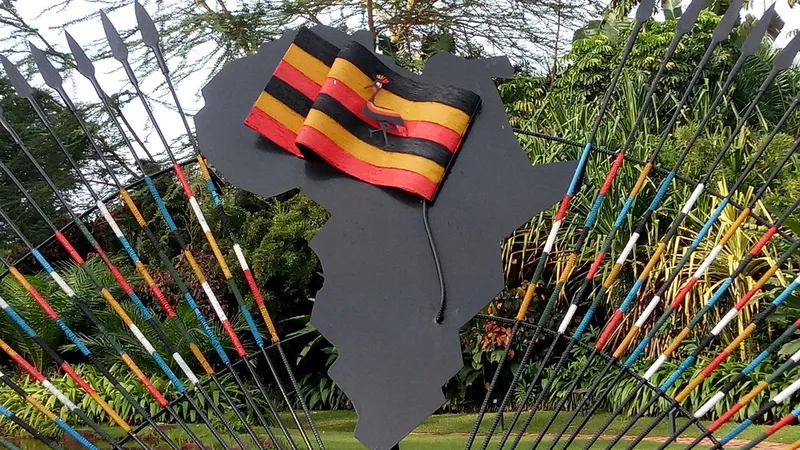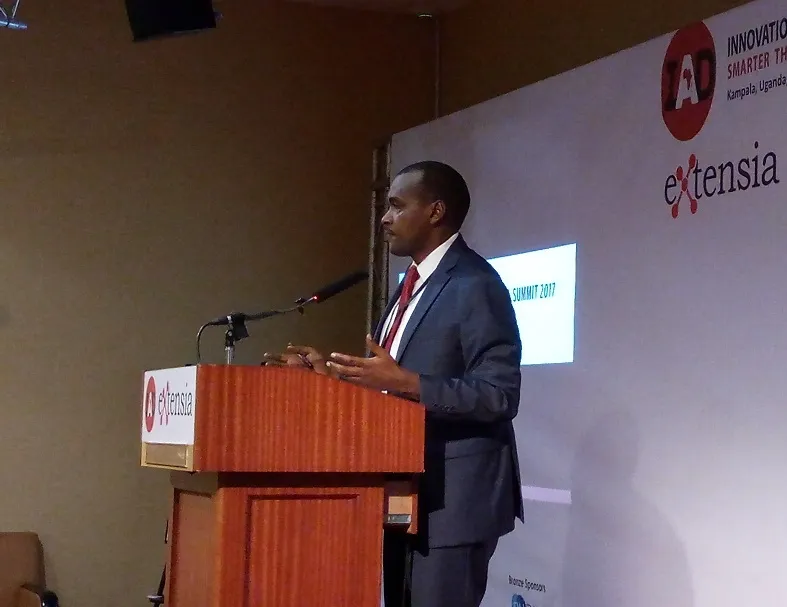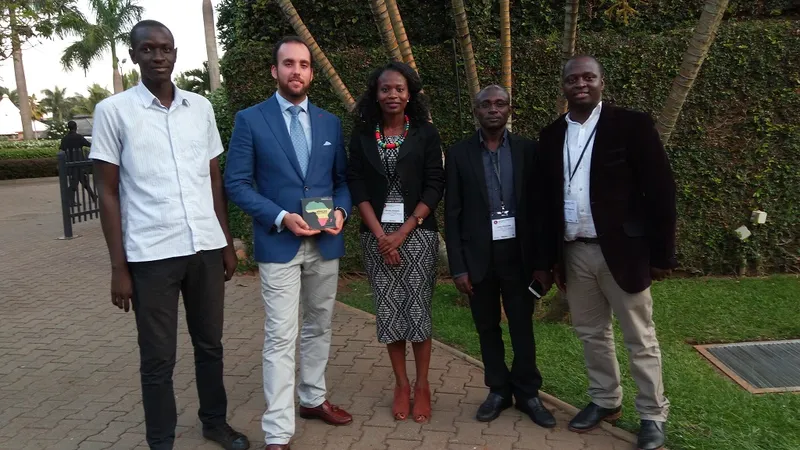Smart data, decisions and development: 10 key takeaways on digital innovation from IADS 2017
The 15th annual Innovation Africa Digital Summit (IADS) wrapped up in Kampala, Uganda, with the participation of over 200 delegates and 50 speakers from 24 countries. See also my earlier write-ups on Extensia's IADS 2016 (Nigeria), 2015 (Zimbabwe) and 2014 (Gambia).

Successive waves of digital technology have opened up vast treasures of insights from data patterns, which can be blended with industry experience and domain knowledge across sectors. The conference dealt with smarter management of ICT infrastructure, networks, data sourcing, management, and security.
As conference chair, here are my 10 key takeaways from the two-day event with respect to business strategy, ICT impacts, risk management, digital startups, and collaborative governance. See also my review of the book Success in Africa: CEO insights from a continent on the rise.
Tech trends and industry dynamics
Key drivers of digital disruption include fast time-to-market for digital innovations, market gaps ripe for entrepreneurs to exploit, and investor appetite from finance stakeholders, explained Bora Varliyagci, CEO, Digital Things, South Africa. The data explosion opens up a range of analytics: descriptive (what happened), prescriptive (what should we do), and predictive (what could happen).
A number of speakers discussed the ‘7 Vs’ of the data explosion: volume, velocity, variety, variability, volatility, viscosity, and veracity. A sound data strategy helps companies with accuracy, agility and accountability. However, digital challenges for organisations include too much data, too little governance, and not enough talent, cautioned Samir Sharma, CEO, DataZuum.
Successful players in sectors such as e-commerce have sliced and clustered data to come up with a range of customer categories: stars, rising, sliding, new, sleeping, and prospective consumers. “Know, understand and love your data,” advised Sharma.

Smart business strategy
Smart data strategies entail not just comprehensive analytics but real-time decision-making as well. Business flexibility today means taking decisions that combine historical data with current data in real-time, explained Emmanuel Osanga, Regional Head - Information Management, Standard Bank Africa, South Africa.
Companies should be focusing not only on product development and marketing but also on customer centricity and engagement. Smart risk management consists of not just flagging anomalous or suspicious activities over a period of time, but in doing so in real time. New opportunities lie in integrating data sets – for example, transaction information from phone usage, utility payments, and supermarket purchases. But care should be taken to respect customer privacy as well.
Companies should make sure they have their ‘small data’ in order before they embark on a Big Data strategy, cautioned Osanga. He charted a two-dimensional data maturity framework for companies, with internal-external data (Y axis) and analytics types (X-axis).
Decision-making is now based on a combination of our knowledge, experience, intuition, and data. However, without proper strategy, organisational culture, and appropriate tools, companies can suffer from decision paralysis: not enough data, or the inability to find relevant data and act on it in real time, cautioned Samir Sharma of DataZuum.
A must for data-driven decision-making is accurate, on time, valuable, and actionable data. Unfortunately, many companies and government organisations are stuck with ‘slow data’ – it is outdated or difficult to use, observed Sharma. “If you don’t act in time, your data becomes dead data,” he cautioned. He also advocated the use of communication techniques such as visualisation and storytelling to bring business intelligence to broader audiences.

Government and Data
Statistics is the lifeblood of digital governance, according to Luxolo Lengs, Chief Director of Business Modernisation at Statistics South Africa. Thanks to the use of digital technologies such as tablets for data entry, the cost of conducting big-scale households surveys has significantly reduced from what it was in the past, while also achieving a many-fold increase in household coverage. Now that this valuable data is in digital form, it is shared in the form of infographics and videos for teachers to increase citizen awareness about the value of data.
“Nintey-five per cent of our processes are automated and digitised. Electronic cargo tracking systems have been in place since 2013,” explained James Kisaale, Deputy Commissioner – Customs, Uganda Revenue Authority. Digital tracking via GPS and IoT sensors have reduced trucking delays, thefts and tampering, and saved the government $754,000 in 2016.
“Digitisation reduces corruption, and creates a competitive ICT investment climate,” said Kisaale. He showed a live online demo of trucks being tracked from Mombasa port in Kenya to Kampala.
Digital government benefits have been realised in Kenya as well. “Integrated revenue collection, thanks to digital technology, increased our revenue streams fivefold,” said Leonard Wakoli, ICT Director, County Government of Bungoma, Kenya.
Social impacts and opportunities
The development community and social entrepreneurs have lots to gain from the data wave as well. In the social sector, it is not enough to go from idea to implementation – there also has to be subsequent impact, advised Sean Blaschke, Health Systems Strengthening Specialist, UNICEF Uganda.
He cited a number of examples of ICT4D (ICTs for development) in Africa, such as UReport (free SMS-based youth dialogue service, with 300,000 youth reporters), e-health (iHRIS, RapidPro, mHero - used during the Ebola crisis), and national id registration (Uganda).
The combination of real-time citizen reporting with real-time government monitoring is key for effective service delivery, said Blaschke. He outlined the Principles for Digital Development as useful implementation guidelines; these include open innovation, co-creation, user focus, scalability, and sustainability.
The data tsunami also offers a range of opportunities for organisations that can offer ‘outsourced’ services such as content curation, data validation, image tagging, and algorithm training for AI implementations. These include traditional BPO players as well as social enterprises. “We give enterprise data servicing jobs to women and youth from marginalised communities, such as slum dwellers in Kenya, Uganda, and India,” explained Martin Njoroge, Senior Director, SamaSource, Kenya.

Digital risk and security
In addition to the opportunities for productivity and innovation, ICTs can open up new types of risk. The three requisites of data security are confidentiality, integrity and availability, explained Leonard Wakoli, ICT Director from Kenya.
Software failures can lead to business loss, customer erosion, and regulatory fines, cautioned Guy Krige, Principal Consultant, Escrow Europe, South Africa. Companies therefore need rapid response teams, partner security strategies, and skills in digital forensics, advised Bora Varliyagci of Digital Things.
Sources of revenue leakage include SMS scams and phone smuggling, added Mohamed Issa, Regional VP Africa, Mavenir. An estimated 60-70 percent of phones imported to Africa do not have tax accountability. Mavenir offers a range of security solutions in this regard, including an innovative offering called Multi-ID, which allows users to have one overlay number for all their devices.
Community strategies
New opportunities and innovations open up when data sets are linked and connected. Examples of such collective initiatives include Aid Transparency and Global Humanitarian Assistance. “It is important for organisations and communities to create a culture of data use,” advised Wilbrod Ntawiha, Data Scientist, Development Initiatives Uganda.
Allan Kyazze, Network Manager, National Information Technology Authority of Uganda, advocated a cooperative framework of the ‘3 Es’ of ICTs: enhance government services, enrich business, and empower citizens. At a professional community level, the Africa Data Science Association has been formed for capacity building, standards, networking and events in Africa.

Startups and entrepreneurship
The FTTH Council as well as ETix Everywhere explained how large companies and government agencies can innovate by engaging more often, more closely, and more deeply with startups. Useful engagement platforms for such entrepreneurial partnerships include incubators, accelerators and corporate investment arms (see my framework of 15 Innovation Tips: how large companies engage with startups).
Digital innovation offers a new hope for Africa, said Linus Wamanya, Board Member, Startup Silicon Ventures Africa, Uganda. A range of innovators were present at IADS, covering digital content, community curation, e-commerce, investment, and acceleration: Yammzit, Todo Trade, Innovation Village, and The Ugandan. Frugal innovations from Africa and Asia are already being replicated and scaled up in other parts of the world (see my write-up from the Africa4Tech Summit in Marrakech).
Digital inclusion
An estimated 25 percent of Sub-Saharan African youth are illiterate, and rapidly scaleable solutions are called for to improve educational outreach and capacity building for teachers. Satellite projects such as iMlango are good examples in this regard, said Erik Childerhouse, Principal Consultant, Avanti.
Principles of universal access to ICTs, particularly in rural areas, should include affordability and equity, said James Beronda, Manager of Technical Monitoring, Uganda Communications Commission. The focus should be on useful content in addition to connectivity; the government of Uganda is promoting school ICT labs and health centres along with educational content and health portals in this regard.
A panel of policy experts from the Private Sector Foundation of Uganda, TTI, AfriNIC, TechnoBrain, and ICT ministries of Ethiopia and Uganda offered a wide range of models for public-private partnerships to fund new digital infrastructure; these include revenue sharing and matching crowdfunding.

Intelligent infrastructure
The next wave of ICTs – the Internet of Things (IoT) – is changing how ICT infrastructure itself can be managed. They add a ‘digital skin’ that allows for better monitoring, security, responsiveness and efficient utilisation.
“Digital experience management via sensors can offer trusted validation for telcos and regulators,” said Ricardo Barcena, VP MEA, CASE on IT, Spain. Existing infrastructure such as bank ATMs can be transformed to offer omni-channel interaction, explained Waqas Mirza, Managing Director, Avanza Solutions.
Policy for the Digital Age
Policy can make or break the development agenda in the way it is framed and executed, said Shola Sanni, Policy Manager, Africa, GSMA, citing a number of examples of ICT policies in countries such as Kenya and Nigeria. She urged the policymaker community to be more open in sharing their stories and experiences with regulation.
Policymakers also need to embrace a spirit of openness and experimentation in dealing with frontier technologies, advised Julius Muia, DG, Delivery Secretariat, Kenya Vision 2030. For example, it was an academic at the Central Bank of Kenya who urged experimentation for m-Pesa when it was an emerging payment solution; today, the mobile money platform is hugely successful in Kenya. Academics and the private sector should persistently and proactively engage with policymakers, urged Muia.
The audience also had a number of suggestions: regulators should make it easier for a startup to submit telco tenders, without requiring a minimum operating history of 10 years. Regulators should work hard in improving their competence and fairness, and governments for their part should not pay mere lip service to the independent functioning of regulators.
Africans, particularly youth, should also start getting involved with internet governance so that Africa can have a say in the kind of internet it gets. It is important to keep track of and participate in the deliberations of ICANN, advised Arinola Akinyemi, Board Member, AfICTA, Nigeria.
The two-day event included workshops on rural broadband (by Avanti) and digital partnership platforms (by Extensia Bridge), as well as a multi-lingual percussion-dance programme celebrating ‘many centuries of folk culture’ by Ndere Troupe. (For other examples of African culture and wisdom, see my app ‘African Proverbs’ – accessible for download on Apple and Android devices.)
Topics suggested by the audience for future conferences include process automation, artificial intelligence, next-gen infrastructure, hybrid cloud platforms, content ecosystems, entrepreneur-intrapreneur linkages, and more. We look forward to IADS 2018 already, with a new range of insights on digital innovation, social inclusion, and ecosystem engagement!








